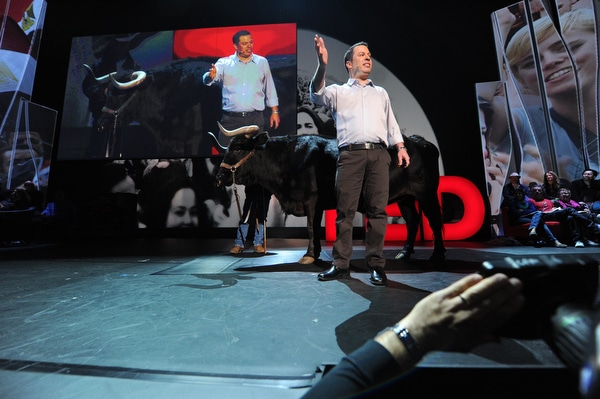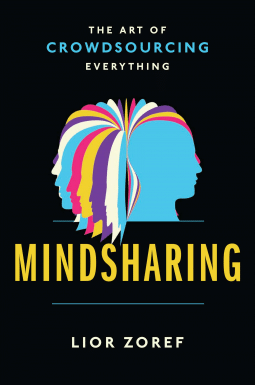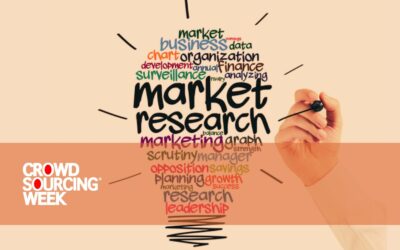
TED2012: Full Spectrum. February 27 – March 2, 2012. Long Beach, CA. Photo: James Duncan Davidson/TED
Can you imagine what two heads can achieve to solve a problem? A popular quote sums it up: “Two are better off than one because together they can work more effectively. If one of them falls down, the other can help him up.” True enough, no man or woman is an island. When individuals team up and collaborate, their enthusiasm becomes contagious and they can achieve greater things together. Through crowdsourcing, the impossible becomes possible.
Crowdsourcing success stories are innumerable, interesting and inspiring such as the portable party disguised as the Coolest Cooler, the popular Pebble watch that snagged $20.3 million in pre-orders on its version, and the inspiring stories on how people can become digital humanitarians in action during disaster relief. Crowdsourcing is maturing beyond design competitions and funding. At CSW2, we have come to defining crowdsourcing in the bigger context of the ‘crowd economy,’ made up of 14 parts that include the overlapping concepts of the sharing economy, open innovation, mass collaboration, and crowd intelligence.
On the business perspective, consumers are moving to sharing or renting instead of purchasing; a new mindset has emerged. There’s a shift from ownership to access, which is affecting purchasing habits. And how can businesses take advantage of global movement? Do the crowds have the “superpower” to enhance our lives and businesses? Lior Zoref, a crowd wisdom researcher, an international speaker and a consultant with fourteen years at Microsoft, with his recent position as VP of Marketing for Consumer and Online Services will tell us more about his perspective on crowdsourcing and its ability to supercharge our thinking and upgrade every aspect of our lives. Lior is also the author of “The Art of Crowdsourcing Everything: Mindsharing.”
As a crowd researcher and evangelist, how did crowdsourcing change your life?
Crowdsourcing has changed my life in countless ways. It helped me to figure out that it was time to follow my dreams of pursuing a Ph.D. and led me to quit my job at Microsoft. It allowed me to realize my dream of becoming a TED speaker, after much encouragement from my crowd. And it started me on the journey to write this book, the culmination of everything that I’ve been working towards. Without crowdsourcing my life wouldn’t be what it is today.
You’ve shared a handful of stories and cases on how the crowd contributed on your projects and speeches, what was the craziest idea or advice that you’ve ever received that has gained significant results?
When I started to prepare my TED talk, I reached out to my crowd for advice on how to create a memorable presentation that would really teach people about the power of Mindsharing and crowd wisdom. The best and most outlandish idea I received was from a sixteen-year-old who suggested I recreate an experiment published in the 1907 edition of Nature. In the experiment, a crowd of eight hundred was asked to guess the weight of an ox at a country fair. While no one knew the true weight of the ox, the median weight the audience guessed was more accurate than the individual estimates of cattle experts polled outside of the crowd.
Following through with this suggestion from my crowd seemed crazy, but I loved it. I ended up doing this exact experiment on the TED stage with a real ox right beside me, proving to the crowd that their collective intelligence was smarter and more valuable than any single expert advisor. It was this crazy crowd-sourced idea that made all the difference in giving a TED talk that really impacted people in a powerful way.
What was your inspiration to write the book, Mindsharing? What is it all about?
 After returning from my TED talk, many people began to ask me what I had planned next. I honestly hadn’t given much thought to my future goals after TED and wavered when trying to figure out my game plan. Shortly thereafter, I received this email from a stranger:
After returning from my TED talk, many people began to ask me what I had planned next. I honestly hadn’t given much thought to my future goals after TED and wavered when trying to figure out my game plan. Shortly thereafter, I received this email from a stranger:
Dear Lior,
I really enjoyed your talk at TED this year: it was moving, inspiring, and fascinating. I am a book and media agent, and I work with visionaries like Nelson Mandela, Richard Branson, neuroscientist Daniel Siegel, M.D., and many others on books that can create a wiser, healthier, and more just world. I think crowdsourcing is a very important part of the future, and I think you did a marvelous job of presenting it in a very accessible and exciting way.
I wonder if you might be interested in talking about creating a book based on many of the themes and topics covered in your talk. I’ve read Wikinomics and am familiar with Howe’s Crowdsourcing, but would love to talk about whether there’s room for something else, perhaps with a little more heart and soul, like your talk.
Let me know if this idea captures your imagination.
All the best,
Doug
I was taken aback that anyone would want me to write a book and I even checked to make sure that the email was really meant for me. However, I was inspired by Doug (my agent’s) passion for my work and from that moment on my new dream was born: to write a book where I could share all of my knowledge about crowdsourcing with the world. I was eager to spread the word about how crowdsourcing could help anyone figure out their finances, relationships, careers, and more. I titled this dream Mindsharing and now I finally have the finished product to share with all of you.
Now that we’re in the era of Mindsharing in the crowd economy, how can businesses take advantage of it? How can collective wisdom help them in the strategies? Can you cite some cases/samples, please? How about for personal goals?
Many of you might believe that your company’s best ideas come from only a few of the brightest workers within your business. However, applying Mindsharing to business has proven that the use of collective wisdom can help you to innovate more and achieve greater results than if you had relied on the ideas of only a few brains.
There are many crowdsourcing platforms that businesses can tap into for help on solving complex problems. One such platform is called InnoCentive, a community with over 300,000 people dedicated to problem solving. InnoCentive spurs usage by allowing businesses to post cash prizes for solutions to challenges, and then brokers the exchange of intellectual property and prize between solver and challenger. By using resources like InnoCentive, business and nonprofits can harness the full power of crowd wisdom to solve their most complex problems. Every business should take advantage of the wisdom of the crowd.
How do you see the state of crowdsourcing 10 years from now—in your country (Israel), and globally?
Ten years from now I envision Mindsharing as a commonplace practice in technology, business, and life. In a way, I see Mindsharing as becoming a ‘superpower’ for all of us. Imagine a world where all of our information is crowd-sourced and anything we want to know can be figured out in real-time. We could instantly know the nutritional content of the food on our plate, receive dating advice from the crowd on the spot, or figure out the answer to any question or solution to any problem. When we are connected to the crowd, our superpowers grow exponentially. I have no doubt that crowdsourcing will play a role in solving the world’s greatest problems and in altering the course of all of our lives.
Lior Zoref is a crowd wisdom researcher, an international speaker, and a consultant. He worked for fourteen years at Microsoft, most recently as VP of Marketing for Consumer and Online Services.



0 Comments